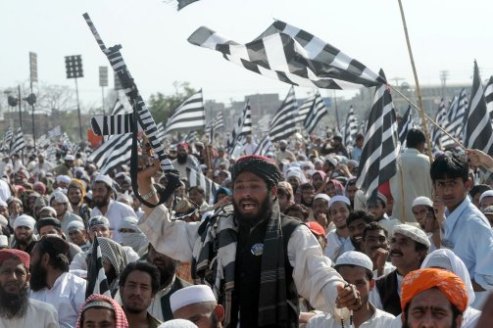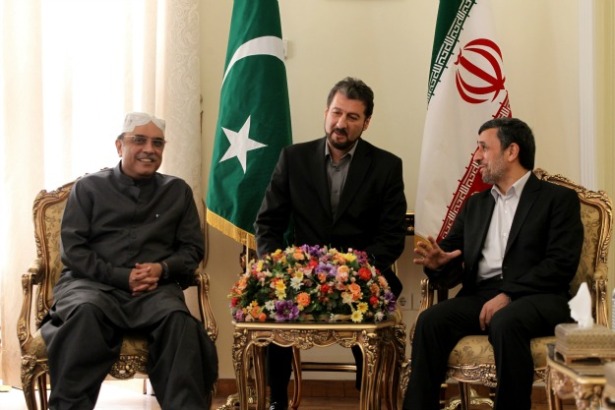Pakistan’s Dangerous Elections
As Reported by Fasih Ahmed for The Daily Spin
A self-confessed peddler of nuclear weapons, a sport star turned messiah, a Saudi proxy who once wished to declare himself the Shadow of God on Earth—these are just some of the candidates in Pakistan’s upcoming national elections.
Much rides on the May elections, which, if they take place as planned, will mark the first-ever transition in Pakistan’s history from a fully civilian elected government to another. The path to revival or ruin for this nuclear-armed nation of some 180 million will depend on the results of what is shaping up to be a highly contentious—and dangerous—race. At stake is how Pakistan will deal with the looming withdrawal of U.S.-led forces from Afghanistan, where Pakistani generals fear India will establish a foothold. Then there is the issue of the state’s inchoate policy toward the al Qaeda and Taliban terror franchises that has cost Pakistan some 49,000 lives since the 9/11 attacks. Add to that the economic mess—food and fuel shortages, unemployment, inflation, mounting costs from the war on terror, running deficits from voter-pleasing social welfare and development schemes—and the electorate’s not surprising loss of faith in Parliament.
And terrorists, especially the Pakistani Taliban, have threatened to disrupt the elections through intimidation and assassinations. Among their avowed targets: President Asif Ali Zardari and his Pakistan Peoples Party (and their political allies, which are also deemed liberal and pro-American) as well as former president and Army chief Pervez Musharraf, who recently ended his four-year self-exile and returned to Pakistan.
The Election Commission has pleaded with the Army to help keep the peace on May 11. But already, the violence is taking its toll. On Sunday, a bomb disrupted the campaign office belonging to a Zardari ally in northwestern Pakistan. Two were killed, and at least five injured. The Pashtun-dominated party is also being bloodied by drive-by bombings in Karachi. Earlier this month, the district election commissioner of Quetta was shot dead, and pamphlets warning citizens against voting have been menacingly strewn across Baluchistan province.
At the same time, terrorists have promised not to disrupt the prospects of cricket legend Imran Khan or the Pakistan Muslim League (NAWAZ), a party strategically allied with sectarian and terrorist groups for electoral muscle.
Pundits have speculated that threats from the Taliban as well as the weight of incumbency will suppress turnout and that the goal of “free, fair, and peaceful” elections mostly will remain an unfulfilled aspiration. But the 85-year-old chief election commissioner of the country, Fakhruddin G. Ebrahim, thinks otherwise. During the last election, voter turnout hovered around 40 percent. But Ebrahim says several factors–including a vibrant media culture, a generation of young idealistic voters, and an empowered civil society—could bring a surprising turnout as high as 60 percent of the electorate. “When I see the enthusiasm of the people, I am inclined to think it is possible,” he told The Daily Beast. “No one can promise that the democratic exercise will be completely free and fair,” he says. “But I am confident the 2013 elections will be different.”
This time, 86.1 million Pakistanis—more than a third of them between the ages of 18 and 30—are registered to vote at polling stations across the country. The Election Commission has allowed some 148 political parties to run, allotting symbols to each party to help voters who cannot read. Nuclear salesman A.Q. Khan’s party, for example, has been given a missile; Imran Khan’s, a cricket bat.
With more than 10,000 candidates nationwide, the polls will present Pakistanis with a range of options to choose from. The left—which wants social freedom and liberties, peace with India, a laissez-faire approach to Afghanistan, continued strong relations with the U.S., and curbs on the Army’s power—is led by the Pakistan Peoples Party and its allies. The right—anti-India, anti-America, and preaching the importance of religion in political life—is represented by Imran Khan and his party, the Pakistan Tehreek-e-Insaf; Saudi-backed former prime minister Nawaz Sharif and his Pakistan Muslim League, as well as smaller religious parties. The fringe is occupied by Musharraf, A.Q. Khan, and the political divisions of militant groups that have also been allowed to run.
According to the most recent polls, if elections were held today, they would yield a hung Parliament, and thus require expert coalition building. That in turn would mean that candidates spearheading smaller parties—candidates such as Imran Khan—will become kingmakers, handed disproportionate power to decide Pakistan’s future.
Fasih Ahmed is the editor of Newsweek Pakistan. He won a New York Press Club award for Newsweek’s coverage of Benazir Bhutto’s assassination. Ahmed was also the inaugural Daniel Pearl fellow and worked at The Wall Street Journal’s Washington, D.C., bureau in 2003. He graduated from Columbia University and lives in Lahore.



















You must be logged in to post a comment.